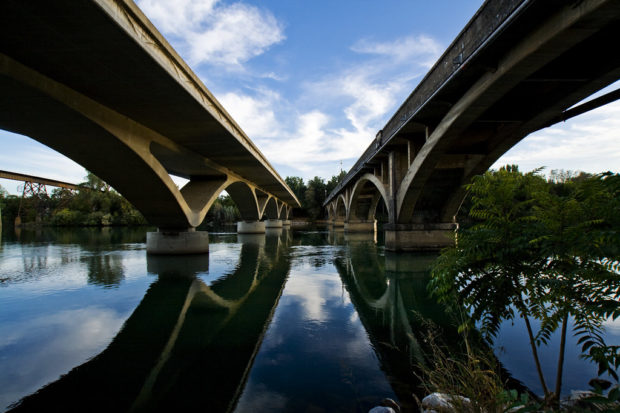
The Jerry Brown administration has backed away from a proposal to build two huge tunnels to divert Sacramento River water around the Bay Delta. Jerry Meral, the deputy director of natural resources, is a leading figure in the effort to resolve California’s water issues. He told the Assembly Water, Parks and Wildlife Committee that the tunnel is no longer considered the leading option.
A peripheral canal or tunnel was previously being pushed by a “hydraulic brotherhood” of Valley water interests and politicians as a fait accompli. The Bay Delta Conservation Plan will consider other ways to balance Delta ecosystem needs and supply water to farms and cities.
As North Coast Rep. Mike Thompson (D‒Napa) sees it, the massive exports of water from Northern California to farms and cities in the south is against the law. Thompson represents California’s 1st Congressional District, which stretches from the Oregon border to the north Delta. “Just because you want to farm something someplace that doesn’t have water doesn’t mean you steal water from another place. And you certainly don’t steal it from other farmers, and you don’t steal it from the fishery.”
Thompson refers to a legal principle called the “area of origin.” Its intent is to protect water-rich areas from becoming water poor because of diversions out of the watershed. The issue is currently being litigated.
Dante Nomellini manages the Central Delta Water Agency and has been on the battlefield for decades. He says the government made a promise in 1948, “The Secretary of the Interior said there is no intent on the part of the Bureau of Reclamation ever to divert water from the Sacramento Valley—a single acre foot which might be used now or later.”
Like agribusiness in the San Joaquin Valley, the economy of the Delta and Northern California depends on abundant water flows. Rep. Thompson thinks it’s a high priority to protect the region’s food production and wildlife habitat, “Delta area agriculture produces over $3 billion worth of agricultural products, and some of the best wine made in the world, and if you go north of there its very heavy agriculture in the northern Sacramento Valley. So every farmer who is growing rice in the upper Sacramento Valley is providing a substitute for migrating waterfowl, migrating shorebirds, everything that uses the flyway. That rice land is now the Pacific flyway but if it were to go away there wouldn’t be a flyway.”
For 30 years, North Coast fisherman Dave Bitts has depended on the symbiotic connection between the Delta watershed and the Pacific Ocean, “Sacramento River fall Chinook are most of the fish I catch. In fact, if they were to go away as they did for a couple of years—that’s it, we’re done, we’re off the water, because all the other rivers combined cannot make up for the absence of Sacramento fall Chinook, or the scarcity of them either. And those fish all have to go through the Delta as juveniles in order to get to the ocean alive. So in order for me to do what I do, and for any ocean fisherman to do what he or she does, we need a much healthier Delta than we have now.”
In 2009, federal scientists issued a biological opinion, concluding that pumping too much water from the Delta jeopardized species of endangered fish—the famous Delta smelt. That resulted in severe cutbacks in water diversions. Since then, the scientific opinion has been politically challenged, by San Joaquin Valley interests.
Dick Pool manufactures equipment for salmon fishermen and hasn’t made a profit in three years. He says, because of the biological opinion, salmon are making a comeback, “Salmon live three years, so the little ones go out and it takes three years to know how many of them have come back. It’s been three years and we’ve got a little upward blip. We think the biological opinion is beginning to work. But there’s a lot of discussion about stressors in the Delta, and they’re all there. In my take, I’d say it’s 80% overpumping and 20% all the rest.”
For fisherman Dave Bitts, the battle being waged over the Delta’s future has high stakes, “Basically, that same biological opinion says if we continue current water practices in the Delta, which means exporting 5 million acre feet a year south of the Delta, all anadramous fish in the Valley will go extinct.”
With growing political pressure to increase water transfers, legislators in Northern California insist on a conservation plan that protects the Delta region’s vital interests. John Garamendi (D‒Walnut Grove) represents the 10th Congressional District, which includes the western half of the Delta, “There has to be a clear understanding and acceptance that the ecological system of the Delta is important and cannot be destroyed. Once that is understood, then the solutions to the water problems can be found. But if that is not understood and accepted, then the fight will go on and on.”
